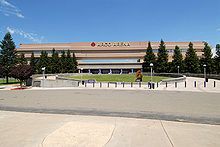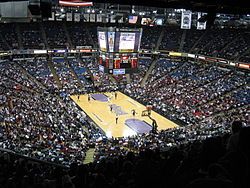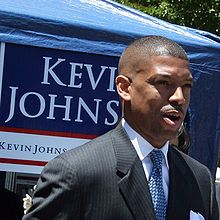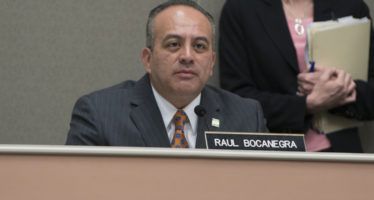Johnson’s Big Plans May Backfire
Katy Grimes: Sacramento Mayor Kevin Johnson has made no secret of the fact that he’d like a big, beautiful new sports arena in the city.
Johnson is also still pushing for a change to the city charter to make the Sacramento Mayor an “Executive Mayor,” and not just one of nine votes on the City Council. His latest plan is actually a very good plan.
But Johnson can’t have both – he is undermining both plans by supporting the other.
Taken individually, the sports arena and Executive Mayor system are large, complex issues. Taken together, one spells disaster for the other.
Here’s the problem: Politicians are always surrounded by ‘yes’ people. Their groupies build them up, and keep telling them how great they are, and that everything they propose is a winning idea.
Sacramento Sports Complex
No one is apparently telling Johnson that the latest arena scheme is a real stinker. Sticking city residents with higher parking costs just to pull money out of city-owned parking lots is nothing more than an arena tax. And taxpayers know it.
Sacramento taxpayers emphatically voted down the arena proposals five years ago. Since then, savvy voters have only become more wary with the ensuing arena deals.
But what most people don’t know is that the arena deal is being pushed by the NBA. A story published on the NBA’s website demonstrated this: “Sacramento is a relatively small NBA market and the aging Power Balance Pavilion where the Kings play lacks many of the profit-boosting features seen in newer arenas, such as a variety of premium seating options that command higher ticket prices. In addition, the state capital lacks large corporate operations, which have helped other cities finance arenas, like the Staples Center in Los Angeles or the United Center in Chicago.”
Sacramento already has an arena, albeit “relatively small” and aging. Sometimes it sells-out, sometimes it doesn’t. That’s more of a team problem than an arena problem. A bigger luxury arena would not sell more tickets to see the Kings.
If Sacramento had a consistently-winning all-star NBA team, the games could be played in an rickety old arena, and it would be to sell-out crowds. The fans are fans of the game, not luxury boxes and flowing champagne.
However, the NBA wants the fancy arena, with more expensive luxury boxes for big corporate sponsors. The NBA wants fancier digs, highfalutin vendors… and higher ticket prices. And they want Sacramento to put up some of the cash, or shut up.
“The economic downturn has left few politically viable sources of public money in California. And Sacramento voters in 2006 overwhelmingly rejected a sales tax increase to finance an arena,” the story stated.
It’s all about the image for the NBA. It’s economic for the NBA – and not for Sacramento. All that Sacramento will get is higher ticket prices, and higher downtown parking costs. That should really help the dilapidated downtown mall and struggling K Street shop owners.
If the city council agrees to the ridiculous parking deal, chances are that some businesses will decide that they no longer need an office in the downtown. My monthly city parking lot costs $145. If the parking lot sale goes through, monthly parkers like me will probably get stuck with $200 parking bills. Shoppers will be hit with the higher parking costs. It’s a penalty to downtown employees, and translates only as an arena tax. Higher costs like parking come out of taxpayers’ bottom line, and only serve to dig deeper in our pockets.
$145 a month for parking may sound low for San Francisco and Los Angeles, but this is Sacramento – we are not parking near a thriving business district or Tiffany’s, Neiman Marcus, Saks and Barneys. Sacramento’s Downtown Mall shoppers can choose from 12 eyebrow threading stores, Macy’s, movie theaters, a food court, Payless Shoes, and a Hyundai showroom. And the Westfield Mall is for sale – it is apparent that the mall owner gave up a long time ago on the sad mall.
Executive Mayor
The Executive Mayor plan has been modified four times. This latest plan is a good one and probably needed, after the recent redistricting shenanigans orchestrated by city council members. It was a gross abuse of power, for which they should have been recalled.
Johnson’s idea of a strong mayor is worthy. “The Checks and Balances Act of 2012” still proposes the mayor as chief executive, responsible for the budget proposal, chooses a city manager, and no longer will have a voting position on the city council.
The mayor would also get limited veto power.
The biggest change in the latest version of the executive mayor proposal is the Mayor will no longer have the power to hire and fire city officers, city attorney and city clerk, and will not be able to hire and fire department heads – those powers would remain with the city manager. Proponents say that this is the most significant change and brought balance to the plan.
The plan adds in a sunset date to automatically revert back to the mayor-council system should voters not like the new system. This is a good safeguard, without having to advance a campaign to make the change back. But if voters are happy with the new executive mayor system, they can reaffirm it.
The Executive Mayor/Checks and Balances Act :
* Separates power: mayor and council have separate and different roles, each is accountable to voters – makes the mayor the chief executive of the city, rather than the city manager;
* Realigns authority: mayor’s role becomes more administrative, but council has authority of approval – Would have a City Council President preside over council meetings, rather than the mayor, so he does not have to manage the minutia at the weekly meetings;
* Streamlines responsibility: more direction comes from the mayor, more direct accountability for successes and shortfalls;
* Concentrates efficiency: mayor is executive branch, council is legislative branch, each with ways to “check” and “balance” the other;
* Would create an Independent Redistricting Commission;
* The mayor would propose a budget that gets approved by the council.
Two two public policy professors recently discussed the Mayor’s plan at a Metro Chamber event. Dr. Barbara O’Connor from CSU Sacramento, and Professor Robert Benedetti from University of the Pacific, said that the mayor should be the “chief negotiator” of the city, and should be available for leadership decisions, rather than the day to day city council meetings. They said that the Mayor’s focus should be as “aggregator for the city’s vision and use the bully pulpit to set the tone for the city pursue bigger ideas.” Both professors felt that the changes in this proposal would be helpful in increasing transparency and accountability, and address the public’s distrust and distaste for government.
The current proposal can be found here.
Mayor Kevin Johnson already has his hands full with the city charter change, and should remain focused on this. He needs to sell this latest version to voters, who are already leary of the plan.
Throwing the arena deal into the fray will only lead to more of the distrust and distaste for local government felt by Sacramento voters, as well as probable defeat.
If arenas are such a good investment, Johnson could stand up to the NBA and tell them to find funders. It’s obvious that no one wants to pay for the arena, including taxpayers and city residents.
The history is there to prove that arenas are losing financial deals for cities. Sacramento is already running a serious deficit; giving up the parking lot revenue is foolish, particularly knowing that any new arena will lose its luster within 20 years. While the next round of city officials will be screaming about needing another new or upgraded arena, the leaseholders of the city’s parking lots will be enjoying their lucrative 50-year lease. It’s a short-sighted, bad deal for city residents and for the city, and proof that city officials see their roles on the council as terminal – they’ll be long gone by the time this all falls apart.
FEB. 20, 2012
Related Articles
What’s really wrong with health care
June 3, 2013 By John Seiler What’s really wrong with health care? A New York Times article showed some of
Sexual harassment fallout at Capitol could mean headaches for other state Democrats
The far-reaching reverberations from the Harvey Weinstein sexual harassment scandal continue to roil the state Capitol more than two weeks
School bond problems go far beyond LAUSD purchase of iPads
Gov. Jerry Brown’s skepticism about state assistance for local school districts’ construction projects appears to be primarily based on an







